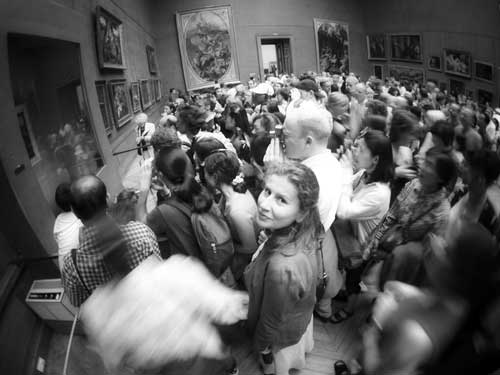
The Mona Lisa at the Louvre
How we can all be our own archaeologists now ...
Back at the beginning of my career I stood by the argument that archaeologists needed to take responsibility for their research and its political implications
- archaeology as a field of contemporary cultural production
- archaeology as a key component of efforts in modernity to create senses of ethnic, national and personal identity
- the archaeological past open to multiple voices
- counter to the familiar master narratives of the human past developed in the eighteenth and nineteenth centuries.
This challenged the paradigm that archaeological and museum work are primarily custodial - with professionals looking after the past (fixed in its happening back then) for people, as stewards (see particularly Social Theory and Archaeology and Experiencing the Past).
Since then, archaeologists and heritage managers have come to accept their resposnibility to listen to stakeholder interests in history and the archaeological remains of the past. To look for ways of co-producing the past, professionals and academics working with other interested parties.
In 2002 I began experimenting with new kinds of participatory software that lets groups of people work together in creative ways, with no strong hierarchy of leadership, with the possibility of an organic and collaborative discovery of emergent insights as a team works together on a joint project - say to pull together a local history, to build a community memory book, to run a multi-disciplinary archaeological field project.
Four years later - the Wallenberg Foundation funded a project in my Metamedia Lab and in Stanford Humanities Lab to work with colleagues in Gotebörg, Sweden (Kristian Kristiansen, Håkan Karlsson, Anders Gustafsson) to research and assess the potential of collaborative and participatory media in the field of cultural heritage.
It is one of the first projects of its kind to relate these technologies to a specific field of expertise, knowledge, practice and cultural value.
The future of cultural identity lies in the past. Vital relationships with the cultural past are increasingly regarded as crucial components of community health in a globalist world. This project aims to develop and test learning tools and environments for enhancing co-creative exploration and learning in cultural heritage. We see this field as one that runs through many humanities disciplines. The project's particular expertise and focus is on archaeology and classical studies.
We aim to assess innovative pedagogy that encourages collaborative exploration of cultural heritage, including collaborative authoring software and ICTs which enable effective project-based and performance-based learning. We propose to evaluate our current experience of such pedagogy and to run and evaluate three new experimental pilot classes. These cover pre-college, undergraduate, postgraduate and professional students. We will use the results of this research to refine our understanding of the educational challenges.
We aim to test the proposition that learning environments in the humanities can be markedly enhanced by innovative pedagogy which is designed to reach beyond purely academic disciplines into community heritage by addressing interests in cultural and personal identity. We will do this using qualitative analysis of student interactions and use of ICT (our software records such data), and through qualitative assessment (interviews and case studies) of the experience and outcomes of the classes.
Main site - [link]
[link] - the proposal as accepted by the Wallenberg Foundation for 2006-2007.
